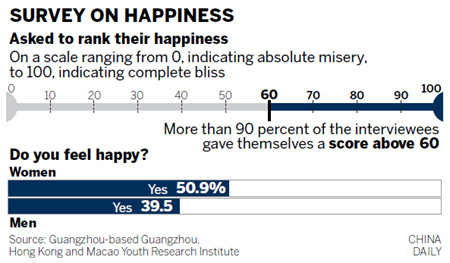Survey shows happiness widespread in Guangzhou
Most of the young people in this Guangdong provincial capital say they are happy, according to a recent survey.
The survey was conducted by the Guangzhou-based Guangzhou, Hong Kong and Macao Youth Research Institute in April.
Five hundred young residents, whose ages ranged from 17 to 35, were interviewed. They came from all walks of life; most of them had been born in the 1980s.
Asked to rank their happiness on a scale ranging from 0, indicating absolute misery, to 100, indicating complete bliss, more than 90 percent of the interviewees gave themselves a score above 60.
What's more, 26.7 percent put their scores at more than 80, indicating they are very happy with their lives, according to the survey.
Only 9.8 percent of the respondents gave themselves scores of less than 60. A mere 6.2 percent said they did not feel happy at all in Guangzhou, which is well known as a center for China's reform and opening-up policy.
An official from the Guangzhou Committee of the Communist Youth League said Guangzhou is a great place for people to go to secure a sense of happiness.
"The city's reputation and residents' feeling of belonging were greatly improved after the 16th Asian Games, which took place this past November," said the official, who did not want to be named.
He said Guangzhou is becoming more and more beautiful.
Gao Xingwen, a young white-collar worker, said Guangzhou is very tolerant of people who come from outside the city.
"And the city, which is enjoying rapid economic growth, offers a myriad of opportunities to young people," he told China Daily on Monday.
University students were the happiest people among the young in Guangzhou, according to the survey.
Following them were civil servants, staff members of public institutions, freelancers and employees of foreign-funded companies. Of the young people who said they did not feel happy, most were employees of local private companies.
And women were happier than men. Some 50.9 percent of the women surveyed said they feel happy, while only 39.5 percent of the men said so.
Influenced by traditional Chinese notions about sex roles, most men said they think they should bear more responsibility than women in society and in providing for a family.
And more than 80 percent of the young people in the city think the government's work to make Guangdong province a happier place directly affects them.
Of the government's plans that are likely to have the greatest influence on people's livelihoods, the young in Guangzhou are most supportive of three: The plans to build more affordable housing, to improve the city's communication systems and to raise the standard of medical treatment for both urban and rural residents.
Of the young interviewees, only 30 percent have purchased their own apartments. More than 50 percent said they are eager to buy their own houses in coming years.
 0
0 







